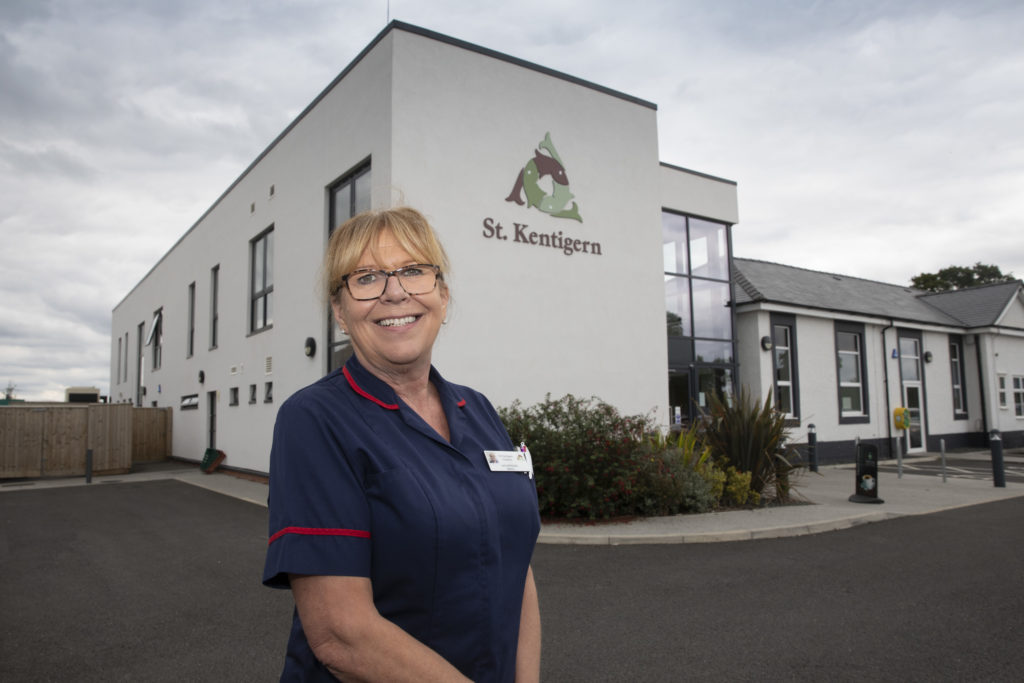
A hospice matron has spoken out over concerns that patients in need of end-of-life care are staying away because of fears heightened by the pandemic.
According to Jane McGrath, the numbers of in-patients and outpatients at St Kentigern in St Asaph – which serves parts of Conwy, Denbighshire and Flintshire – have been well below capacity in the wake of the Covid crisis.
She worries some families are instead struggling desperately to cope at home through the heart-breaking trauma of end-of-life illness.
The matron wanted to reassure patients and their loved ones that there was no reason to be afraid of reaching out for help at the most difficult time of their lives.
St Kentigern was closed for 12 months while a £2.8 million extension was built.
Matron McGrath was appointed to manage the reopening of the hospice, with day therapy services returning in January 2020.
The new 12-bed in-patient unit opened in the March on the day the UK went into total lockdown.
The modern design of the in-patient unit meant that the 12 ensuite rooms, which all have individual access to the gardens, meant that loved ones were still able to visit throughout the height of the pandemic.
It was, said the matron, a cruel irony that people were going without help when the facilities at the new-look hospice were second to none.
She pointed out the problem of stay-away patients was not unique to St Kentigern because other hospices across Wales were also experiencing a reduction in referrals from the NHS.
The matron said: “It was a very difficult and challenging time when the pandemic struck and we bubbled up the in-patient unit and had to stop our day therapies and services because we couldn’t bring a lot of vulnerable people in and put them at risk.
“The positive aspect was that we continued to care for people and we were able to let people have that precious time with their families.
“It was incredibly difficult and we were all frightened but we did it, albeit with smaller numbers.
“We are privileged that the community have supported us to have this building and the patients have dignity because all the rooms are individual rooms with en-suite bathroom facilities.
“The facilities here are absolutely wonderful but the magic of St Kentigern is the people. They’re the ones that matter.
“The support we provide is not just about the patient, it’s about the carers as well – it’s a whole family thing. We can be supporting 10 patients and 30 family members, so I am developing the family support team.
“People can feel quite alone and frightened sometimes so you see when they come here, they breathe a sigh of relief. It’s like being enveloped in a hospice hug
She added: “We work very closely in partnership with the Specialist Palliative Care team in Glan Clwyd Hospital who also see patients in the community, so the majority of our referrals come through them.
“There is a national shortage of GPs and in some practices people no longer have a named doctor.
“One consequence is that people are sometimes being diagnosed a bit later than they might previously have been.
“The system isn’t functioning in the same way as it was pre-pandemic and that is having an impact on all hospices across Wales so it’s not a local problem as such.
“The key is for me is to let people know who we are and let the community know we are here when they need us.
“If you’re a patient who’s been diagnosed with a cancer or a life-limiting illness that is palliative not curative and you feel they could benefit from accessing some of our services, then please speak to the health professional supporting you and we can talk about a referral.
“I also understand that people are frightened of the word hospice. While people do come here to die, people also come here and live. Quality of life is important at every single stage.
“If you’re a carer and you’re really worried about how you are going to cope because the death of your loved one is close and you don’t know where to turn, come to talk to us.”
It was a message echoed by hospice chief executive Iain Mitchell who said: “We don’t want people to endure any additional, unnecessary suffering when they are already having to bear the hardship of an incurable illness.
“We are open and we’re standing ready to serve the community That’s the message we want to get out. If you need hospice care or you want advice on hospice care, we are here for you.”